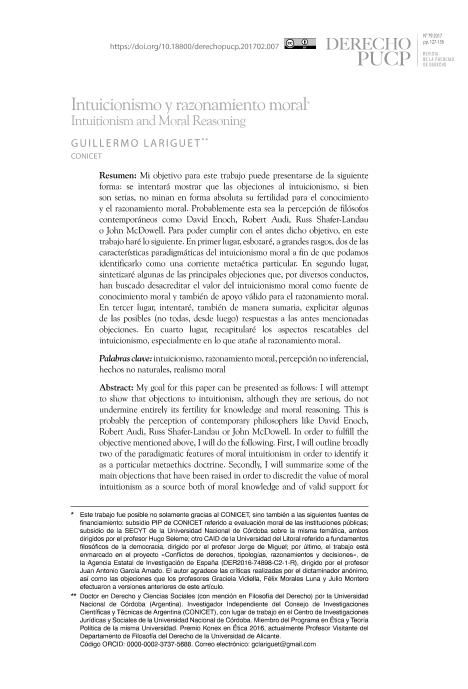Mostrar el registro sencillo del ítem
dc.contributor.author
Lariguet, Guillermo Claudio

dc.date.available
2018-12-04T18:02:22Z
dc.date.issued
2017-11
dc.identifier.citation
Lariguet, Guillermo Claudio; Intuicionismo y razonamiento moral; Universidad Pontifica Católica del Perú; Derecho PUCP; 79; 11-2017; 127-150
dc.identifier.issn
0251-3420
dc.identifier.uri
http://hdl.handle.net/11336/65738
dc.description.abstract
Mi objetivo para este trabajo puede presentarse de la siguienteforma: se intentará mostrar que las objeciones al intuicionismo, si bienson serias, no minan en forma absoluta su fertilidad para el conocimientoy el razonamiento moral. Probablemente esta sea la percepción de filósofoscontemporáneos como David Enoch, Robert Audi, Russ Shafer-Landauo John McDowell. Para poder cumplir con el antes dicho objetivo, en estetrabajo haré lo siguiente. En primer lugar, esbozaré, a grandes rasgos, dos de lascaracterísticas paradigmáticas del intuicionismo moral a fin de que podamosidentificarlo como una corriente metaética particular. En segundo lugar,sintetizaré algunas de las principales objeciones que, por diversos conductos,han buscado desacreditar el valor del intuicionismo moral como fuente deconocimiento moral y también de apoyo válido para el razonamiento moral.En tercer lugar, intentaré, también de manera sumaria, explicitar algunasde las posibles (no todas, desde luego) respuestas a las antes mencionadasobjeciones. En cuarto lugar, recapitularé los aspectos rescatables delintuicionismo, especialmente en lo que atañe al razonamiento moral.
dc.description.abstract
My goal for this paper can be presented as follows: I will attempt to show that objections to intuitionism, although they are serious, do not undermine entirely its fertility for knowledge and moral reasoning. This is probably the perception of contemporary philosophers like David Enoch, Robert Audi, Russ Shafer-Landau or John McDowell. In order to fulfill the objective mentioned above, I will do the following. First, I will outline broadly two of the paradigmatic features of moral intuitionism in order to identify it as a particular metaethics doctrine. Secondly, I will summarize some of the main objections that have been raised in order to discredit the value of moral intuitionism as a source both of moral knowledge and of valid support for moral reasoning. In third place, I will try, also briefly, to explain some of the possible (not all of course) answers to the objections previously mentioned in the paper. Fourth, I will recapitulate the more fruitful aspects of intuitionism, especially in regard to moral reasoning.
dc.format
application/pdf
dc.language.iso
spa
dc.publisher
Universidad Pontifica Católica del Perú
dc.rights
info:eu-repo/semantics/openAccess
dc.rights.uri
https://creativecommons.org/licenses/by-nc-sa/2.5/ar/
dc.subject
Intuicionismo
dc.subject
Razonamiento Moral
dc.subject
Hechos No Naturales
dc.subject
Realismo Moral
dc.subject.classification
Estudios Religiosos

dc.subject.classification
Filosofía, Ética y Religión

dc.subject.classification
HUMANIDADES

dc.title
Intuicionismo y razonamiento moral
dc.title
Intuitionism and Moral Reasoning
dc.type
info:eu-repo/semantics/article
dc.type
info:ar-repo/semantics/artículo
dc.type
info:eu-repo/semantics/publishedVersion
dc.date.updated
2018-10-19T15:19:10Z
dc.identifier.eissn
2305-2546
dc.journal.number
79
dc.journal.pagination
127-150
dc.journal.pais
Perú

dc.journal.ciudad
Lima
dc.description.fil
Fil: Lariguet, Guillermo Claudio. Universidad Nacional de Córdoba. Centro de Investigaciones Jurídicas y Sociales. Consejo Nacional de Investigaciones Científicas y Técnicas. Centro Científico Tecnológico Conicet - Córdoba. Centro de Investigaciones Jurídicas y Sociales.; Argentina
dc.journal.title
Derecho PUCP
dc.relation.alternativeid
info:eu-repo/semantics/altIdentifier/url/http://www.scielo.org.pe/scielo.php?script=sci_arttext&pid=S0251-34202017000200007
dc.relation.alternativeid
info:eu-repo/semantics/altIdentifier/doi/http://dx.doi.org/10.18800/derechopucp.201702.007
dc.relation.alternativeid
info:eu-repo/semantics/altIdentifier/url/http://revistas.pucp.edu.pe/index.php/derechopucp/article/view/19319
Archivos asociados
